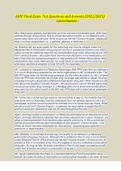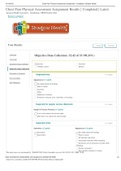NR 509 (NR 509)
Chamberlain School Of Nursing
All 21 results
Sort by
different nursing courses exams bundled together
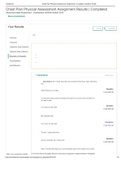
-
Chest Pain Physical Assessment Assignment Results | Completed | Latest
- Exam (elaborations) • 6 pages • 2022
-
- $12.39
- + learn more
Chest Pain Physical Assessment Assignment Results | Completed Advanced Health Assessment - Chamberlain, NR509-October-2018 Return to Assignment Your Results Turn In Lab Pass Overview Transcript Subjective Data Collection Objective Data Collection Education & Empathy Documentation Self-Reflection Education & Empathy : 1 of 6 (16.7%) During the patient interview, there are a number o...
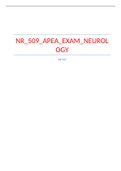
-
NR_509_APEA_EXAM_NEUROLOGY
- Exam (elaborations) • 61 pages • 2022
-
- $15.49
- + learn more
NR_509_APEA_EXAM_NEUROLOGY NR 509 Question 1: Sudden, brief, rapid jerks, involving the trunk or limbs may be consistent with: a. a myoclonic seizure. b. an absent seizure. c. a myoclonic atonic seizure. d. a focal seizure with impairment of consciousness. Explanation: A patient experiencing a myoclonic seizure manifests sudden, brief, rapid jerks, involving the trunk or limbs. A sudden brief lapse of consciousness with momentary blinking, staring, or movements of the lips an...
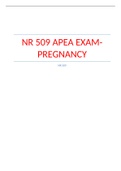
-
NR 509 APEA EXAM-PREGNANCY
- Exam (elaborations) • 33 pages • 2022
-
- $15.49
- + learn more
NR 509 APEA EXAM-PREGNANCY NR 509 Question 1 What is the standard instrument used to auscultate fetal heart tones? A. Stethoscope B. Doppler C. Pre-natal monitor D. Ultrasound Explanation: The Doppler fetal rate monitor is the standard instrument used for this measurement, and can detect the fetal rate (FHR) as early as 10 weeks gestation. Question 2 During pregnancy, what sound may be auscultated at the second or third intercostal space at the sternal border d...
Chest Pain Physical Assessment Assignment Results | Completed | Latest
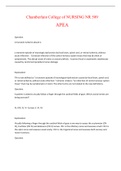
-
Chamberlain College of NURSING NR 509 APEA Questions with correct verifiable answers
- Exam (elaborations) • 35 pages • 2022
-
- $15.49
- + learn more
Chamberlain College of NURSING NR 509 APEA Questions with correct verifiable answers Chamberlain College of NURSING NR 509 APEA Questions with correct verifiable answers
NR 509 Week 6 Pediatric SOAP Note, Summer 2020 Revision Guide
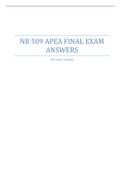
-
NR 509 APEA Final Exam Answers
- Exam (elaborations) • 38 pages • 2022
-
- $16.00
- + learn more
Question: A transient ischemic attack is: a transient episode of neurologic dysfunction by focal brain, spinal cord, or retinal ischemia, without acute infarction. Correctan infarction of the central nervous system tissue that may be silent or abrupt onset of motor or sensory deficits. Incorrectfocal or asymmetric weaknesses caused by central and peripheral nerve damage. Explanation: TIA is now defined as “a transient episode of neurological dysfunction caused by focal brain, spin...
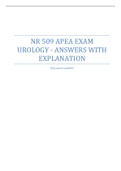
-
NR 509 APEA Exam Urology - Answers with Explanation
- Exam (elaborations) • 8 pages • 2022
-
- $10.00
- + learn more
Question: 1 In men, painful urination without frequency or urgency suggests: Correct: constipation. Explanation: In men, painful urination without frequency or urgency suggests urethritis. Cystitis presents with frequency and urgency. Constipation usually does not present with urinary tract symptoms. Acute prostatitis presents with frequency, urgency, and dysuria. Question: 2 A 65-year-old woman complains that when she feels the urge to urinate, she has to go immediately or else she urina...
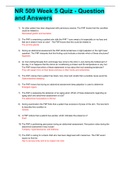
-
NR 509 Week 5 Quiz - Question and Answers
- Exam (elaborations) • 3 pages • 2022
-
- $5.00
- + learn more
1) An older patient has been diagnosed with pernicious anemia. The FNP knows that this condition could be related to Decreased gastric acid secretion 2) The FNP is examining a patient who tells the FNP “I sure sweat a lot especially on my face and feet but it doesn’t have an odor”. The FNP knows that this could be related to The eccrine glands 3) During an abdominal assessment the FNP elicits tenderness on light palpation in the right lower quadrant. The FNP interprets that this fi...

That summary you just bought made someone very happy. Also get paid weekly? Sell your study resources on Stuvia! Discover all about earning on Stuvia

